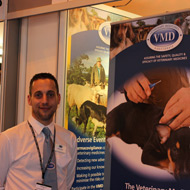
Vets and pet owners can now report adverse effects of microchips
Vets and animal owners can now report adverse reactions to microchips as the VMD launches a new scheme at BSAVA Congress this week.
The VMD already monitors adverse reactions resulting from the use of veterinary medicines. With dog microchipping due to become compulsory in England from April 2016, a system has been put in place for reporting adverse events, in order to allow the VMD to gather and analyse data.
While the main focus of analysis will be on adverse reactions in dogs, reports can be made about any microchipped animal.
The scheme is being backed by the Microchip Trade Association (MTA). Any concerns arising from the reports will be fed back to the microchip manufacturer and MTA so that action can be taken.
Giles Davis introduced the scheme at a press conference today at BSAVA Congress. He says the VMD does not anticipate that the reports will find a significant problem with microchips and currently the number of reports about adverse reactions each year is small.
Anyone can make reports using the online form, including pet owners, veterinary professionals and other microchip implanters.
MTA secretary Sarah Fry said the scheme will help generate "sensible data". In previous reports, it has been unclear whether the chip itself has failed, or has been incorrectly inserted and fallen out.
There are three main categories of adverse reaction to microchipping. Implantation reactions, tending to occur relatively soon after the chip has been implanted, including infection or bleeding under the skin. These are extremely uncommon, according to the VMD.
It is not uncommon for a pain response and a little bleeding at the time of implantation - these are not adverse effects.
Microchip migration can occur when the chip has been incorrectly implanted. The effect of gravity causes the chip to move under the skin to lower parts of the body, making it more difficult to locate it when scanning.
Finally, very occasionally, microchips can simply stop working.
To help ensure the reports are of high quality, Mr Davis said the VMD aimed to make the online form and explanatory leaflet as clear as possible.
Sarah Fry also noted that since she joined the profession around 25 years ago, there is now a greater awareness of the need for accuracy when implanting microchips. She believes the message of how to implant chips correctly must be reinforced.
Information about implantation training will, she says, be made available to every veterinary practice to ensure vets and nurses have the opportunity to improve if they wish.
Mr Davis said it is expected that an annual report will be published on adverse reactions.
The online reporting system is now up and running on the VMD website www.vmd.defra.gov.uk/microchipeventreporting.
Further information on the scheme can be found at: http://vmd.defra.gov.uk/pdf/leaflet_microchip.pdf



 HMRC has invited feedback to its communications regarding the employment status of locum vets and vet nurses.
HMRC has invited feedback to its communications regarding the employment status of locum vets and vet nurses.